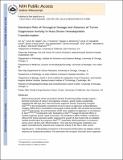| dc.contributor.author | Xu, Jin | |
| dc.contributor.author | Haigis, Kevin M. | |
| dc.contributor.author | Firestone, Ari J. | |
| dc.contributor.author | McNerney, Megan E. | |
| dc.contributor.author | Li, Qing | |
| dc.contributor.author | Davis, Elizabeth | |
| dc.contributor.author | Chen, Shann-Ching | |
| dc.contributor.author | Nakitandwe, Joy | |
| dc.contributor.author | Downing, James | |
| dc.contributor.author | Le Beau, Michelle M. | |
| dc.contributor.author | Shannon, Kevin | |
| dc.contributor.author | Jacks, Tyler E | |
| dc.date.accessioned | 2015-04-09T19:07:11Z | |
| dc.date.available | 2015-04-09T19:07:11Z | |
| dc.date.issued | 2013-06 | |
| dc.date.submitted | 2013-05 | |
| dc.identifier.issn | 2159-8274 | |
| dc.identifier.issn | 2159-8290 | |
| dc.identifier.uri | http://hdl.handle.net/1721.1/96510 | |
| dc.description.abstract | Biochemical properties of Ras oncoproteins and their transforming ability strongly support a dominant mechanism of action in tumorigenesis. However, genetic studies unexpectedly suggested that wild-type (WT) Ras exerts tumor suppressor activity. Expressing oncogenic Nras[superscript G12D] in the hematopoietic compartment of mice induces an aggressive myeloproliferative neoplasm that is exacerbated in homozygous mutant animals. Here, we show that increased Nras[superscript G12D] gene dosage, but not inactivation of WT Nras, underlies the aggressive in vivo behavior of Nras[superscript G12D over G12D] hematopoietic cells. Modulating Nras[superscript G12D] dosage had discrete effects on myeloid progenitor growth, signal transduction, and sensitivity to MAP-ERK kinase (MEK) inhibition. Furthermore, enforced WT N-Ras expression neither suppressed the growth of Nras-mutant cells nor inhibited myeloid transformation by exogenous Nras[superscript G12D]. Importantly, NRAS expression increased in human cancer cell lines with NRAS mutations. These data have therapeutic implications and support reconsidering the proposed tumor suppressor activity of WT Ras in other cancers. | en_US |
| dc.description.sponsorship | Pfizer Inc. (PD0325901) | en_US |
| dc.description.sponsorship | National Institutes of Health (U.S.) (Grant R37CA72614) | en_US |
| dc.description.sponsorship | National Institutes of Health (U.S.) (Grant P01CA40046) | en_US |
| dc.description.sponsorship | National Institutes of Health (U.S.) (Grant K08CA134649) | en_US |
| dc.description.sponsorship | Leukemia & Lymphoma Society of America (Specialized Center of Research Award LLS 7019-04)) | en_US |
| dc.description.sponsorship | American Lebanese Syrian Associated Charities | en_US |
| dc.language.iso | en_US | |
| dc.publisher | American Association for Cancer Research | en_US |
| dc.relation.isversionof | http://dx.doi.org/10.1158/2159-8290.cd-13-0096 | en_US |
| dc.rights | Creative Commons Attribution-Noncommercial-Share Alike | en_US |
| dc.rights.uri | http://creativecommons.org/licenses/by-nc-sa/4.0/ | en_US |
| dc.source | PMC | en_US |
| dc.title | Dominant Role of Oncogene Dosage and Absence of Tumor Suppressor Activity in Nras-Driven Hematopoietic Transformation | en_US |
| dc.type | Article | en_US |
| dc.identifier.citation | Xu, Jin, Kevin M. Haigis, Ari J. Firestone, Megan E. McNerney, Qing Li, Elizabeth Davis, Shann-Ching Chen, et al. “Dominant Role of Oncogene Dosage and Absence of Tumor Suppressor Activity in Nras-Driven Hematopoietic Transformation.” Cancer Discovery 3, no. 9 (June 3, 2013): 993–1001. | en_US |
| dc.contributor.department | Massachusetts Institute of Technology. Department of Biology | en_US |
| dc.contributor.department | Koch Institute for Integrative Cancer Research at MIT | en_US |
| dc.contributor.mitauthor | Jacks, Tyler E. | en_US |
| dc.relation.journal | Cancer Discovery | en_US |
| dc.eprint.version | Author's final manuscript | en_US |
| dc.type.uri | http://purl.org/eprint/type/JournalArticle | en_US |
| eprint.status | http://purl.org/eprint/status/PeerReviewed | en_US |
| dspace.orderedauthors | Xu, Jin; Haigis, Kevin M.; Firestone, Ari J.; McNerney, Megan E.; Li, Qing; Davis, Elizabeth; Chen, Shann-Ching; Nakitandwe, Joy; Downing, James; Jacks, Tyler; Le Beau, Michelle M.; Shannon, Kevin | en_US |
| dc.identifier.orcid | https://orcid.org/0000-0001-5785-8911 | |
| mit.license | OPEN_ACCESS_POLICY | en_US |
| mit.metadata.status | Complete | |
